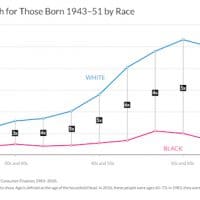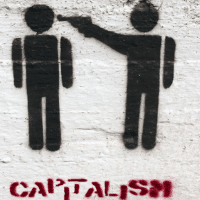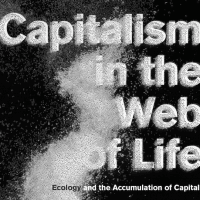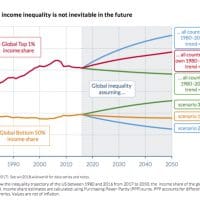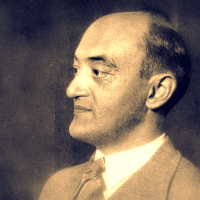-
The Billionaire boom: 82% of global wealth produced last year went to richest 1%
Forida is a 22-year-old sewing machine operator in a clothing factory in Dahka, Bangladesh. She often works 12-hour days producing clothes for brands such as H&M and Target. Sometimes, during busy production cycles, the hours are even longer.
-
After alienation
Since the collapse of the Berlin wall and the Soviet Union, many on the left seem to have swallowed the idea that there is no alternative to capitalism.
-
This is for the Guardian, NYT and the BBC: 1939 to 2018
Before I go any further with this let me state that I’m not a Trotskyist, or a Leninist, or a Stalinist or a Maoist (but I might have been all of the above, with exception of Maoist, at one time or another).
-
Too many whites are in denial about the extent of race-based economic inequality
A recently published paper by three Yale scholars reveals “that Americans, on average, systematically overestimate the extent to which society has progressed toward racial economic equality, driven largely by overestimates of current racial equality.”
-
‘Socialism a necessity for human survival’
According to John Bellamy Foster, the world environmental crisis is a systemic crisis, a product of capitalism, and requires systemic changes in the capitalist system. He says that environmental sustainability is incompatible with capitalism.
-
The end of the road for capitalism or for us all?
we have the certainty that matter remains eternally the same in all its transformations, that none of its attributes can ever be lost, and therefore, also, that with the same iron necessity that it will exterminate on the earth its highest creation, the thinking mind, it must somewhere else and at another time again produce it”. —
Frederick Engels, from the introduction to ‘The Dialectics of Nature’, 1883. -
Profits before people: capitalists abandon Alzheimer’s and Parkinson’s research
Pharmaceutical giant Pfizer will stop research on Alzheimer’s and Parkinson’s disease, and is expected to lay-off 300 research and development staff in Massachusetts and Connecticut, in a move that could severely hamper progress towards effective treatments for these illnesses – proving that critical medical research cannot be left in the hands of capitalist profiteers.
-
On the contribution of István Mészáros (1930-2017) to critical thinking
István Mészáros, an outstanding Hungarian Marxist philosopher, died on October 1st 2017 in London. Born in Budapest in 1930 into a working-class family, brought up by his mother, he began working in industry at the age of twelve. He actually lied about his age, claiming to be sixteen, in order to be accepted by the factory.
-
The kids aren’t alright
When we talk about generations, we tend to talk as if history has always been divided up into them. But the idea of distinct eras of cohorts each defined by some unique spirit is not timeless. The notion of a generation was borne of a conception of history as a machine of progress—a claim central to Enlightenment ideology
-
‘On new terrain’—How Capital is reshaping the battleground of class war
Since the Great Recession there has been much debate on the nature of capitalism and the crisis of neoliberalism. Often this has resulted in theories which emphasise finance capital, precarious employment, and play to a generally left Keynesian politics, such as that being pursued within the Labour Party currently.
-
Ecology and value theory
Jason W Moores Capitalism in the Web of Life sets itself the challenge of locating an account of capitalist commodity production inspired by Karl Marx within the biological, chemical and geological totality we normally call nature. The ambition of the book is therefore immense. Moore proposes a method for understanding world history that shows how economic development is connected to long-wave ecological transformations. At a time when humanity faces profound and simultaneous ecological and economic crises, Moore proposes a kind of meta-theory that explains them as the outcomes of a single logic.
-
Trashing the planet for profit
Before I began this essay I read through some of my past forays that mentioned climate change and capitalism, the first I think, being in 2006 where I opined in a piece on the ‘War on Terror’.
-
Illusions of world-ecology
Every airport bookstore features books with titles like 10 Ways to Retire Rich, 150 Places You Must Visit Before You Die, or 8 Easy Steps to a Flatter Tummy, with the numbers in very large type on their covers. They are the publishing equivalent of junk food, quickie books written to match titles that were invented by the marketing department to generate impulse purchases. The authors and publisher of A History of the World in Seven Cheap Things must have had such books in mind when they chose its title and designed its cover.
-
The elephant in the world
The authors of the report confirm what Branko Milanovic and others had previously discovered: that a representation of the unequal gains in world economic growth in recent decades looks like an elephant. Thus, the real incomes of the bottom 50 percent of the world’s population (except the poorest, at the very bottom) have increased, the incomes of those in the middle (especially the working-class in the United States and Western Europe) have decreased, and the global top 1 percent has captured an outsized portion of world economic growth since 1980.
-
Schumpeter’s two theories of imperialism
Schumpeter’s theory is interesting for several reasons. It was formulated at the same time as Lenin’s and Luxemburg’s and clearly with the knowledge of the two. It reacts to the exactly the same events as theirs. It is different though and it was held by Schumpeter throughout his life. The key text for Schumpeter’s theory is “The sociology of imperialisms” (note the plural) published in 1918-19.
-
The next financial crisis will be even worse than the last one
We’ve made it through 2017. The first-season installment of presidential Tweetville is ending where it began, on the Palm Beach, Fla., golf course of Mar-a-Lago. Though we are no longer privy to all the footage behind the big white truck, we do know that, given the doubling of its membership fees, others on the course will have higher stakes in the 2018 influence game.
-
The new Mafia capitalism
MISHA GLENNY’S new series McMafia was launched on BBC TV on New Year’s Day. It is an appropriate if depressing opener for the new year.
-
Class, race, and U.S. wealth inequality
People tend to have a distorted picture of U.S. capitalism’s operation, believing that the great majority of Americans are doing well, benefiting from the system’s long-term growth and profit generation. Unfortunately, this is not true. Median wealth has been declining, leaving growing numbers of working people increasingly vulnerable to the ups and downs of economic […]
-
“The seeds of revolt are present in many places”
Interview with John Bellamy Foster, Editor of Monthly Review. By JIPSON JOHN and JITHEESH P.M.
-
Can we avoid another financial crisis?
After the Global Financial Crisis, Steve Keen achieved worldwide acclaim with his book Debunking Economics (2011). It attacked the core tenets of neoclassical economics and some of its heterodox rivals. It also revealed Hyman Minsky’s post-Keynesianism as the most promising route to a scientific revolution in economics.




